Uprising, unity, and uncertainty: Power, protest, and politics in 2024
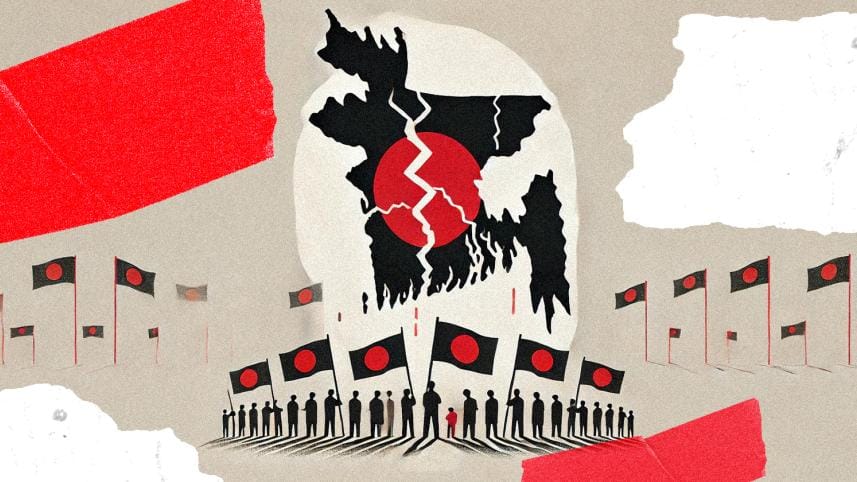
The year 2024 has emerged as the most significant conjuncture in the political history of Bangladesh since its independence in 1971. To state the obvious: on August 5 this year, we witnessed the fall of the longest-serving fascist ruler in the country's history, brought down by the largest mass uprising in the history of Bangladesh. Also known as the July uprising, it was led by none other than students themselves. Indeed, the uprising was an epic of resistance—what some have even metaphorised as a "political earthquake"—that morphed the mundane prose of daily life into the vibrant poetry of broad-based unity, particularly in July and August.
This epic was written with the blood, sweat, and tears of the people themselves as they came together across classes, genders, professions, occupations, political parties, organisations, groups, even generations. For instance, even children—cradled in their mothers' arms or perched on their fathers' shoulders—were visibly present on the streets, embodying the collective spirit of our resistance. And, of course, the costs of this uprising were staggering. At least 1,500 people were brutally killed, with nearly 20,000 wounded, many suffering devastating injuries such as the loss of eyes, arms, legs or other limbs. Those who were murdered came from all walks of life—children, youth, the middle-aged, the elderly, women, workers, and more—each a poignant reminder of the immense sacrifices made in the pursuit of freedom and justice.
But to grasp the significance of the year 2024 in political terms, I believe, requires accounting for its radiant singularity as well as understanding its determinate web of connections—direct or indirect—to preceding years. In other words, it is essential to envision a dialectic of continuity and discontinuity that encompasses a broad temporal horizon—a framework that underscores the imperative to historicise. Rabindranath Tagore, although on a different register, tells us in a poem, "O time past, you wander from world to world, continuing to work in silence" (translation mine). I particularly align with my favourite Black writer James Baldwin, one who instructively asserts that "history is literally present in all that we do." To speak of politics in 2024, then, is also to recall the entire history of political culture that has unfolded since 1972, and—dialectically—with the history of people's resistances to that very culture. So, what does politics look like in 2024? And what is politics, after all?
Politics is often understood as the art and science of governance, involving the administration of government, public policymaking, and control within a formalised state apparatus. This includes the actions of political parties, elected officials, bureaucracies, and legislatures, as well as formal mechanisms like laws, elections, and diplomacy. However, politics ranges beyond the zodiac of formal institutions to encompass all spaces where power relations, power struggles, and decision-making processes and practices obtain and operate—from families and communities to workplaces and even global interactions. It also embraces informal practices, resistance movements, and cultural norms (as the Italian Marxist revolutionary Antonio Gramsci rightly contends, culture is political). In this piece, I address politics in both its formal and broader senses while exploring political culture.
Of course, understanding politics and even Realpolitik requires grasping the underlying political culture. And the mainstream ruling-class political culture that has evolved from 1972 to 2024 can be characterised by at least five broad and distinct yet interconnected trends: 1) the commodification and commercialisation of politics and politicisation of plundering business elites, driven by the logic of capital; 2) the bureaucratisation of politics and the politicisation of bureaucracy; 3) the militarisation of politics and the politicisation of the military; 4) the class-driven politicisation of religion, often divorced from religious principles; and 5) the criminalisation of politics and the politicisation of criminals, as Badruddin Umar aptly described. Together, these trends characterise at least part of what I term the "fascisation of politics," exemplified in practices like extreme nationalism, authoritarianism, corporatism, media monopolisation, cult fetishism, masculinist idolisation or even deification of a singular leader, and repression through organised state violence and surveillance—all continuing to remain decisive hallmarks of Sheikh Hasina's regime in 2024 (more on Hasina's brand of fascism later). Clearly, the trends I have categorically described here egregiously ran counter to the core principles of our Liberation War of 1971—equality, human dignity, and justice—principles that the July uprising sought to reclaim repeatedly with exemplary fervour and brio. Within this framework, then, Hasina's 2024 election (January 7), the year's first major political event, must be understood.
Indeed, from 2008 to 2024, Bangladesh's elections under Sheikh Hasina's leadership were marked by the abolition of the caretaker government system and the establishment of an electoral process that lacked genuine competition. Opposition parties faced repression, electoral fraud, and exclusion, with the ruling Awami League securing unopposed or manipulated victories. Formal elections every five years turned out to be merely symbolic, bereft of public participation. This monopolistic governance led to severe declines in human rights, the rule of law, and economic stability, leaving the people in crisis, its so-called economic growth notwithstanding (more on economic growth later). Kallol Mustafa's 2024 book titled Sheikh Hasina Sarkar: Durnitee o Nipironer Khotian (Sheikh Hasina's Government: A Chronicle of Corruption and Oppression) usefully anatomises and analyses Hasina's electoral authoritarianism. Drawing on his rigorously researched work, I have identified 18 key areas of the fascist Hasina regime's actions, most, if not all, of which continued through 2024: 1) deprivation of voting rights; 2) dismantling democratic norms; 3) suppression of dissent; 4) enforced disappearances and extrajudicial killings; 5) judicial impunity; 6) politicisation of state institutions; 7) corruption and money laundering; 8) bank looting and scandals; 9) stock market manipulation; 10) reliance on foreign loans for costly projects; 11) rising inequality; 12) jobless growth and unemployment; 13) severe labour exploitation; 14) business cartels and rising commodity prices; 15) fabricated statistics; 16) plundering in the energy sector; 17) environmental destruction; and 18) a submissive foreign policy with India, compromising sovereignty. And, undeniably, 2024 emerges as the bloodiest year in our history since 1971—a year soaked in violence and despair. Pablo Neruda's haunting lines resonate powerfully, "Come and see the blood in the streets/ Come and see/ Blood in the streets." At least 1,500 lives were mercilessly taken, and countless others left maimed and shattered, as already noted. This is a year that surely calls for reckoning, not mere remembrance.
Owing to space constraints, I will briefly focus on inequality and the marginalised populations who have suffered most under Sheikh Hasina's regime, both before and during 2024—and who continue to endure hardship today. To put it briefly and bluntly, Bangladesh's economic growth under Hasina has coincided with rising inequality. Since 1986, IMF-led reforms prioritising export-driven trade over welfare have fuelled labour exploitation, inequality, and deregulation in health and education. In the garment industry, employing over 50 lakh workers, wages remained among the world's lowest—Tk 12,500 ($113) monthly, while recent raises still remain inadequate. Roughly, the richest five percent control over 30 percent of the national income, while the poorest five percent hold only 0.37 percent. With 84.9 percent of workers in the informal sector and precarious jobs and more than 9,200 workplace deaths reported since 2013, inequitable policies have widened disparities, leaving most struggling to meet basic needs. Neoliberalism, this historically specific phase of capitalism, has repeatedly failed to provide a way forward.
As others and I have written elsewhere, ethnic, religious, and linguistic minorities—particularly Indigenous communities, Bangalee Hindus, Ahmadis and Shias, Urdu speakers—have faced multifaceted marginalisation since 1975, when Sheikh Mujibur Rahman's one-party authoritarian rule sowed the seeds of fascism. For these groups, land rights have always been a critical issue, compounded by unjust, discriminatory laws—an issue that remains insufficiently addressed to this day.
The July uprising and the subsequent formation of the interim government on August 8, 2024 must be viewed in this broader context. While I can't recount the full narrative of the uprising here, its significance deserves brief but categorical reflection. First, the movement inaugurated a collective political subjectivity and new historical agency, made possible by the creative, non-hierarchical, non-partisan leadership of young students and the oppressive history of fascism and failed resistances. Second, it heightened political consciousness among the people like never before. Third, it immediately secured certain freedom of speech. Most importantly, through the students' anti-discrimination platform, the movement repeatedly reclaimed the three core principles of our Liberation War: equality, human dignity, and justice. Finally, it led to the formation of the interim government, a necessary but increasingly fragile outcome.
The interim government, led by Prof Muhammad Yunus, identifies as reformist, establishing commissions to propose democratic restructuring of state institutions. Student leaders from the uprising, alongside the military and political parties, helped negotiate its composition. However, most of its members, lacking political expertise and experiences (in the hardest sense) and even ties to mass uprisings, do not position the government as "revolutionary." It is unrealistic to expect it to extend beyond limited democratic reforms within the existing undemocratic systems.
To be effective, the Yunus government must reprioritise instead of restlessly moving in numerous directions. First, it must compile a full list of those killed and injured during the uprising and provide financial support to their families. Second, accountability demands that those responsible for the mass killings—especially Sheikh Hasina and her cabinet—be brought to justice. Third, the police and bureaucratic system must be restructured and made efficient. Fourth, the government must address soaring prices of essential goods. Lastly, of course, it must ensure conditions for free and fair elections.
There are immense challenges ahead, both for the government and for us—the people. Let 2025 not drag on but give way to a truly new year of meaningful action and intervention. A new Bangladesh cannot emerge from old ideas and from old, unreformed political parties. Democracy and the country's future decisively rest on centring—not tokenising—the agendas and aspirations of the most exploited and marginalised: poor peasants, workers, women, ethnic, religious, and linguistic minorities, who together constitute the majority. Our real struggle begins now—after the uprising—as we confront the question of how to use our newfound freedom.
Dr Azfar Hussain is director of the graduate programme in social innovation and professor of integrative/interdisciplinary studies at Grand Valley State University in Michigan, US. He is also summer distinguished professor of English and Humanities at the University of Liberal Arts Bangladesh (ULAB) and vice-president of the US-based Global Center for Advanced Studies (GCAS).
Views expressed in this article are the author's own.
Follow The Daily Star Opinion on Facebook for the latest opinions, commentaries and analyses by experts and professionals. To contribute your article or letter to The Daily Star Opinion, see our guidelines for submission.




 For all latest news, follow The Daily Star's Google News channel.
For all latest news, follow The Daily Star's Google News channel. 
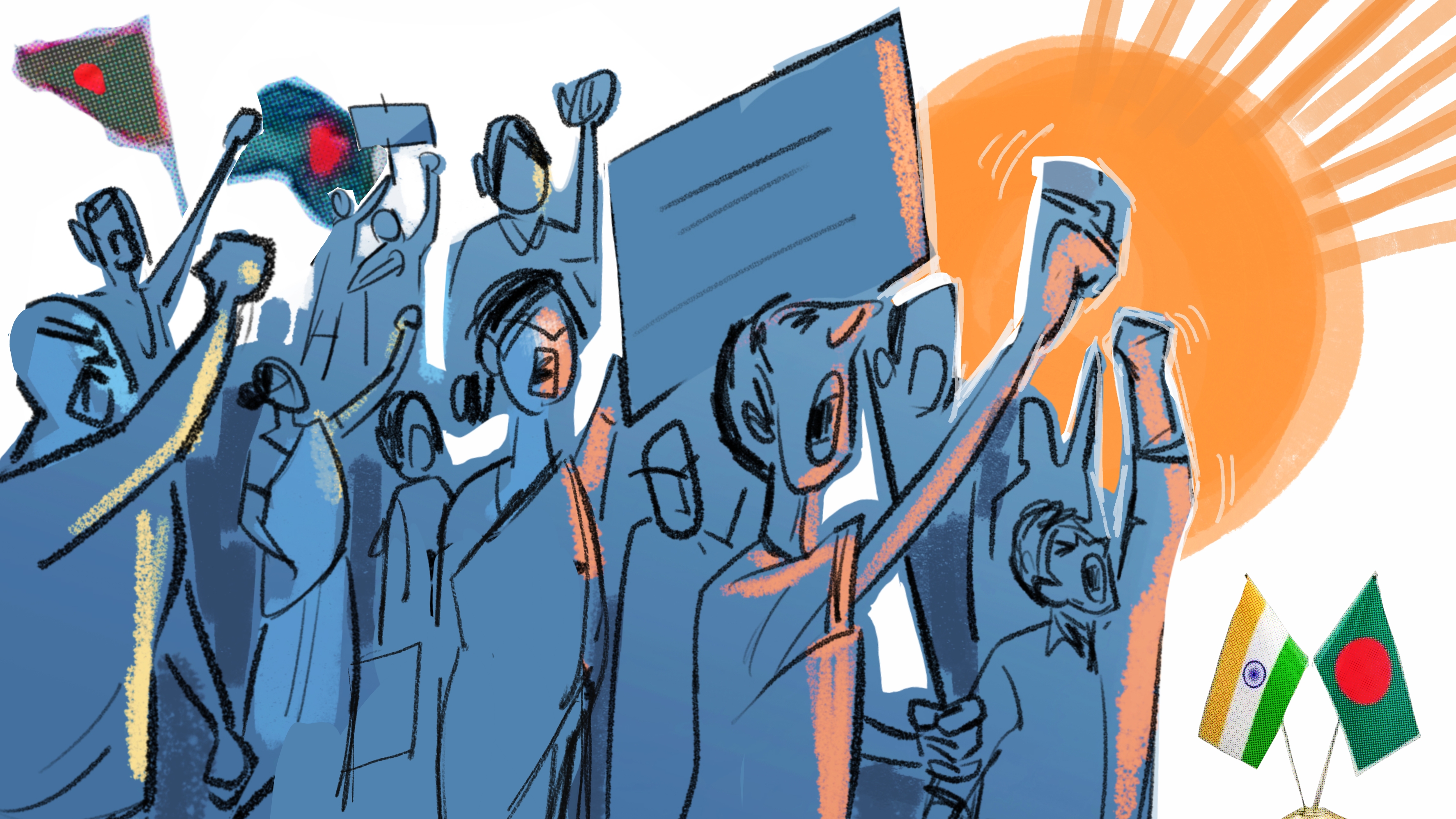
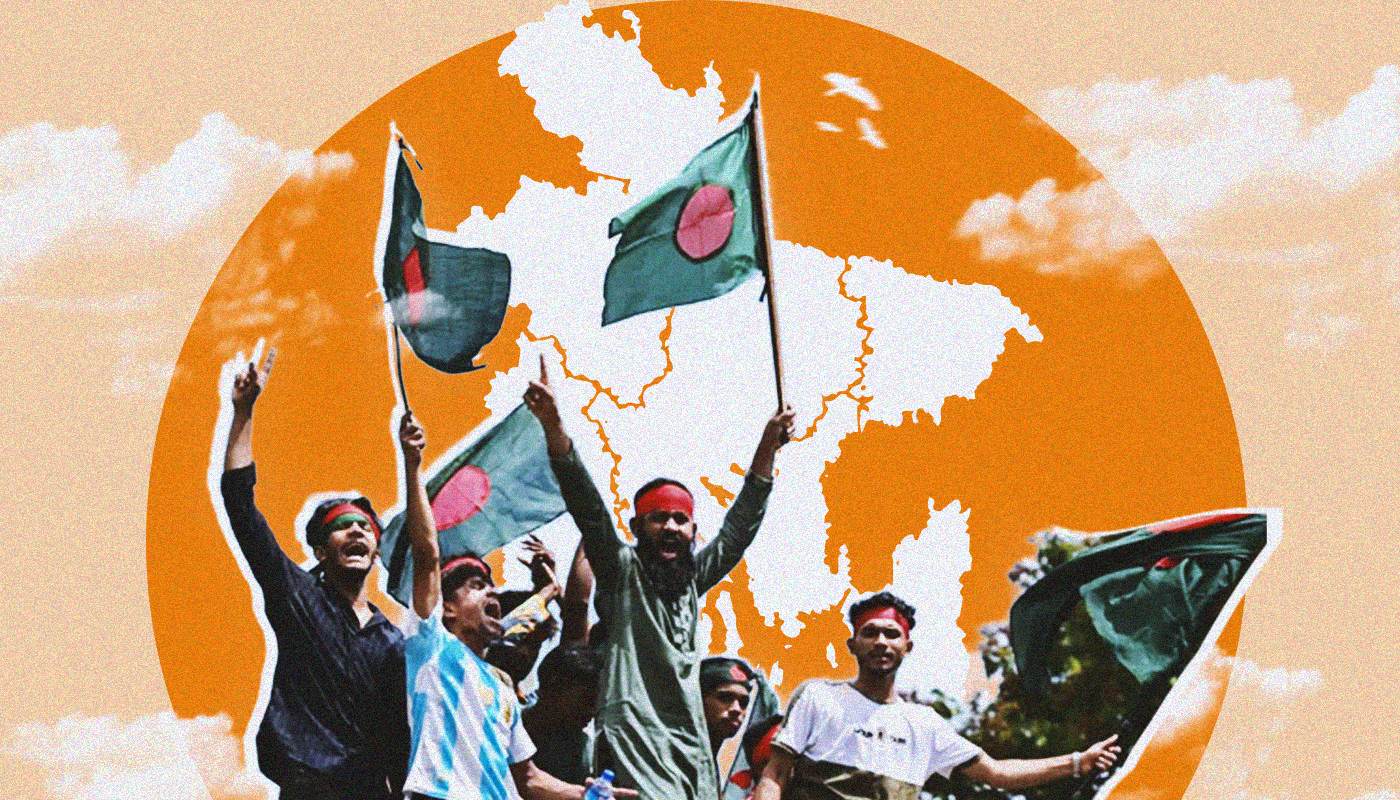
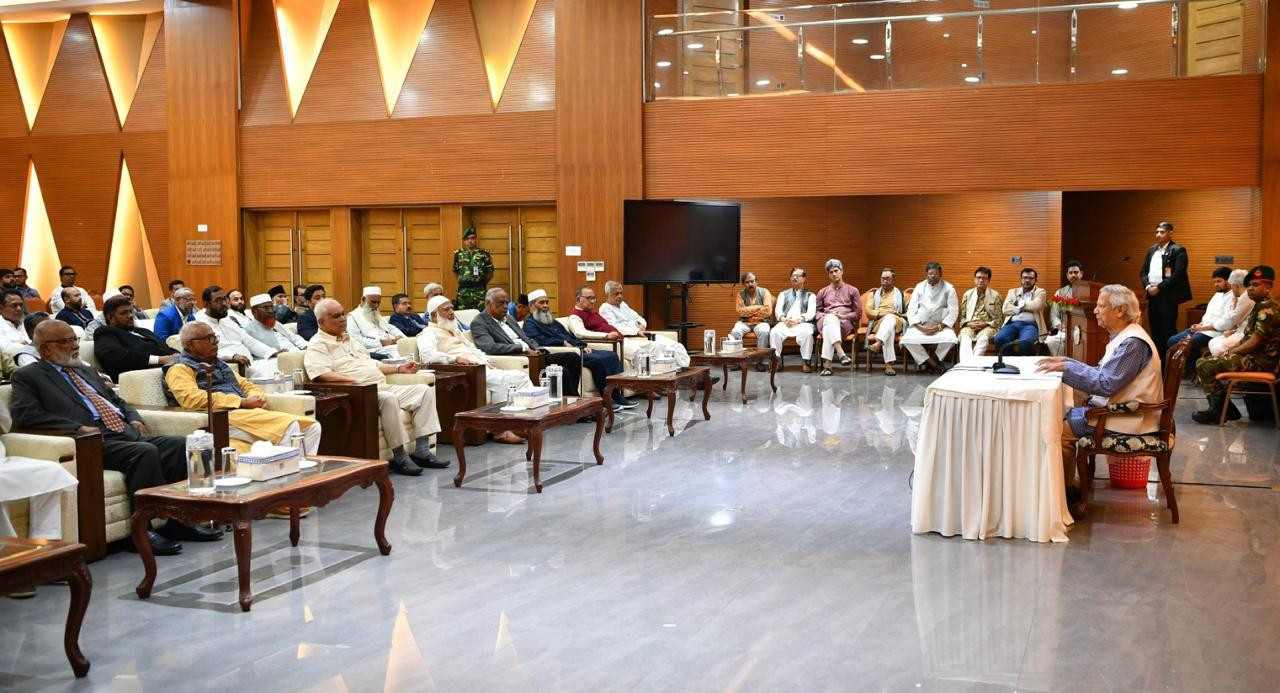
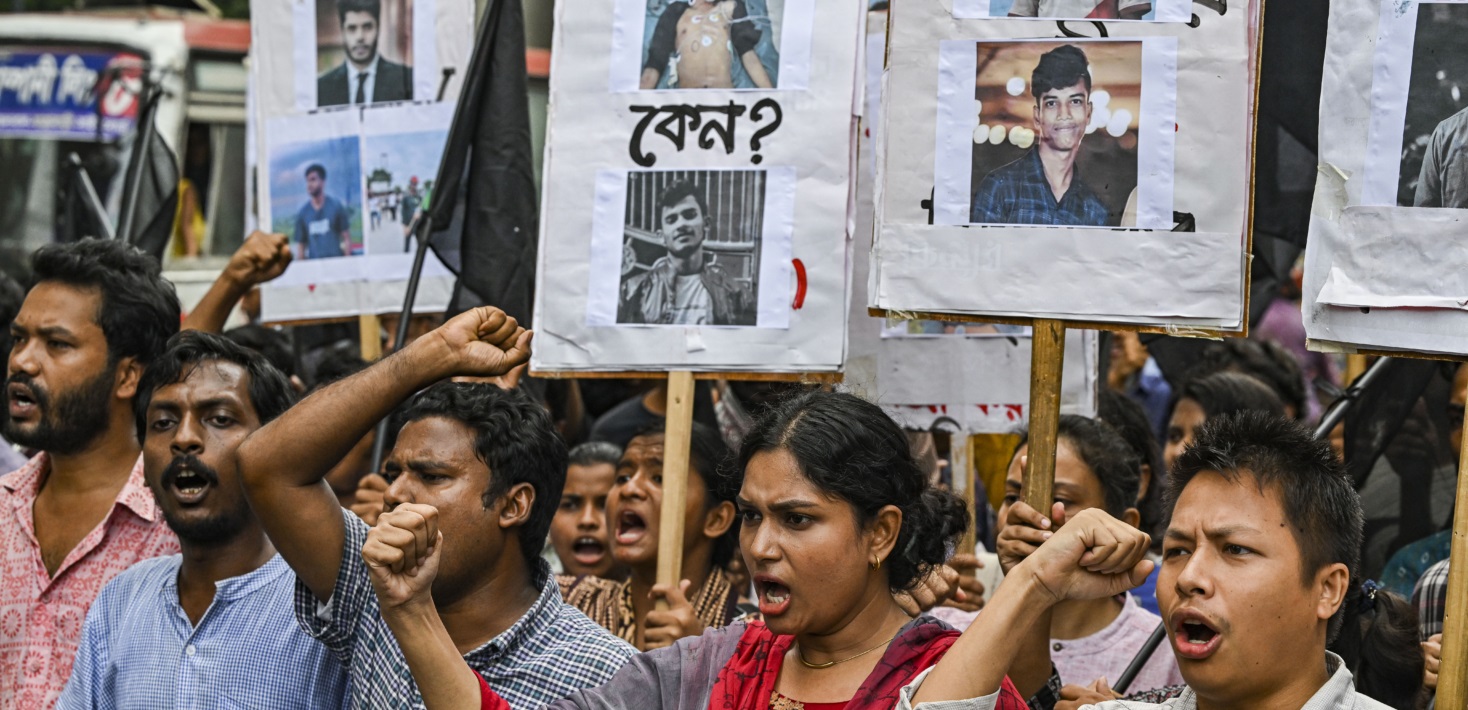

Comments